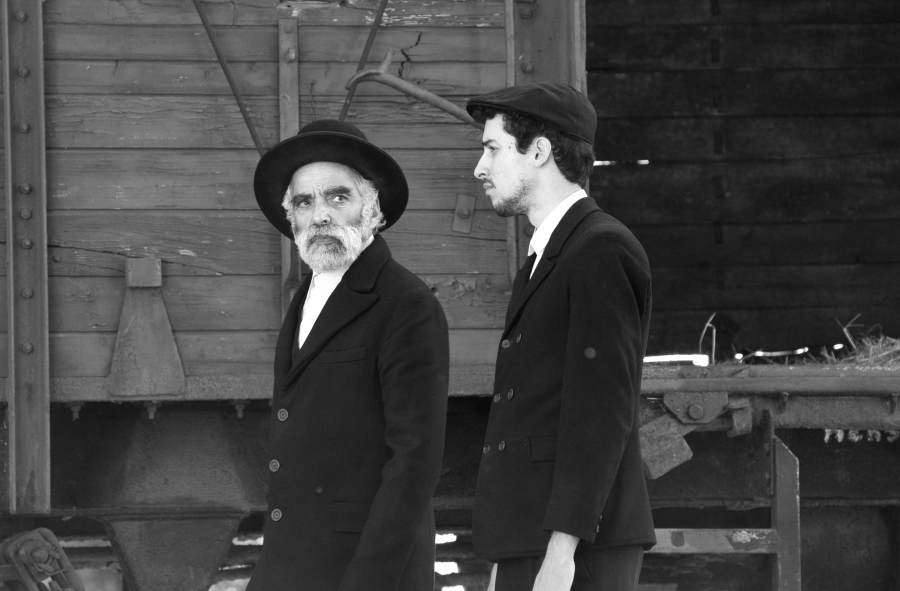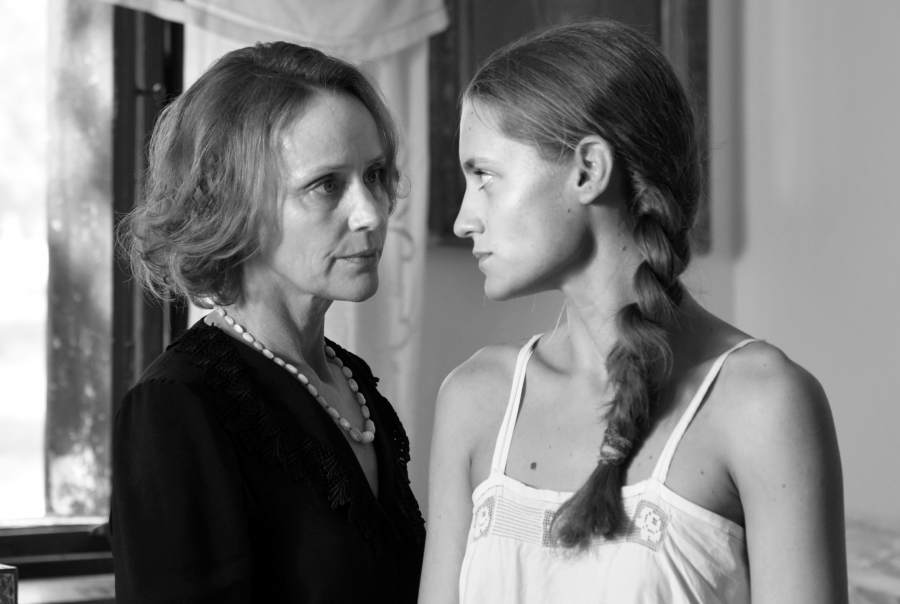

Ferenc Török’s 1945 takes place in the title year, a time when peace had allegedly come back into the world following the horrors of WWII, but in a small Hungarian village on the brink of falling into Communism, the peace came accompanied by ghosts of sins past, in this case the objects and properties stolen from the Jewish villagers who had been deported and most likely sent to their deaths in the years before. As the town gathers for the wedding of the son of the richest man in town, two Orthodox Jews return to their hometown for one last rite. Even if the premise makes the film appear to be something of a revenge story, the vengeance in this case comes not from the hand of other human beings, but from circumstance and the accumulation of injustices committed throughout history.
As the film opens in New York, I sat down to speak to director Török and screenwriter Gábor T. Szántó who have taken on the task of telling stories about a transition period largely ignored by history.
I was taken by the imagery in the film, there was a shot in which we see smoke “reflect” the trees and it made me think of that idea in Judaism about “as above, so below.” Can you talk about the way in which you use spiritual or mystical symbols in the film?
Ferenc Török: Things like that aren’t symbols because in the movie we use realism, rather than symbols we wanted to show these objects in the world. I don’t think we made a movie about symbolism, we have powerful icons but it’s about realism.
Gábor T. Szántó: There’s a scene where one of the characters puts out a cigar, you get the impression of something. The character might not know about the Jews being sent to the crematoriums, but viewers know. Today we know what everything means.
I think you put a lot of trust in your audience members, there are moments when we see things that remain unexplained. You’ve spoken about how nobody talks about this moment in history. Were you hoping audience members would do their homework and go investigate afterwards?
Ferenc Török: Yes, we trust our audience of course. After screenings all over the world, the same questions come up, people are very curious and talk to us about it. We gave them an invitation, people need to know, learn, read, watch movies...we’re talking about a “missing chain” in our history. We don’t know enough.
Gábor T. Szántó: You mentioned mysticism, in one way we can say this film is religious or spiritual. We wanted to have a burial scene in the same way a Jewish burial happens, partly we wanted to show how this is done, but also we wanted to show these things to an audience who’s never watched it. The Jews who arrive in the village represent something very specific, they carry spiritual traditions, while the villagers show greed and materialism.
Ferenc Török: Maybe the movie language isn’t spiritual, but the black and white and the atmospheric music make it seem so. These two characters are on a spiritual travel, it’s very difficult to direct for religious characters. It’s not about gestures, but rather about movement and behavior. It’s much more complex, that’s why the actors who played them one is a professional dancer, we wanted to show proud Jews too who believe in God after the Holocaust. They didn’t lose everything because God showed them a way to survive. They lost their homes, their property, their families, but the Jews in the film aren’t typical examples, because they didn’t lose their faith. We wanted to show two guys who survived not just for two hours but for the future, they rebuilt Israel, they went to the US, their kids are still alive.
There’s a feeling of dread through the movie, but there’s no huge event and no closure even.
Ferenc Török: It’s more a symbolic gesture, like when we see a shop on fire it’s the end of capitalism and the end of this period, it’s the opposite of the peaceful time in which the film begins. We needed a legendary story to happen in this village, something everybody there would remember forty years in the future.
Gábor T. Szántó: There’s a photo album in the shop too, we see the clerk’s son seeing it too, he sees the former owners of the shop and in the fire scene the album is also destroyed, which means the remembrance of the former Jewish citizens of this village also disappears. They disappeared but so did memories of them.

Since there aren’t many films about this time, do you feel you have a responsibility to find this missing link?
Gábor T. Szántó: Absolutely, since I began writing I’ve been interested in what happened with the Jews during Communist times, what roles they had, did they participate in the regime, were they oppressed under Communism because of their Jewishness. In my writing I focus on the so called Jewish renaissance and the creation of a new Jewish identity and whether there could be a religious revival or not. Not only just in the period after the war but also in contemporary history.
Each of the people we meet in the movie could’ve had a film of their own, what was the biggest challenge in narrowing your vision down to the story you needed to tell?
Ferenc Török: We tried to make a model of this society, we wanted different characters so we could show the relation they had to the deportation of the Jews. Everybody in the town has guilt over this, but in different ways. The clerk’s wife sees this in a different way than her son for instance. We also have the feudalist mafia, the clerk and the police, so in the model we built every kind of relations about guilt.
Gábor T. Szántó: Showing the structure of the village was very important, we wanted to show different reactions to the same situation. I think this is a very important part of the film.
Since you’re filling the empty spaces in history, the film is coming out during a time when xenophobia seems to be on the rise, what do you think is the role of art and film when it comes to rescuing these stories?
Ferenc Török: It was important for us to do this film and to pick this summer in 1945 because it’s what nobody talks about. Historians and media have now started to focus on this topic, we really still don’t know what happened after the war, it was a transition between Nazism and Communism, so it didn’t get too much reflection. The film has a universal meaning, it shows the structure of a relatively closed society with a powerful mafia-type man. We see this story repeated all over the world, where rich men rule over poor people who don’t have strong moral standards to reject their desire for the property of others. Human nature is very similar, we are very fragile, we all have ideals about what humans can be, but poverty can push people to do things that don’t fit morally.
Since this period in history is so unknown what were some of the facts that surprised you the most?
Gábor T. Szántó: The discounted auctions, which is how powers corrupted society and pulled them in, they offered them the property of the former local villagers at half the price. After the events in the movie the Communist party took the property of the villagers to nationalize it. In several places in the world there is this kind of redistribution, where the State takes things from the bourgeoisie to give them to the poor people, we see this in modern societies too, rich people push others through political oppression. We see the same tricks over and over.
Ferenc Török: The Holocaust was an extreme event, it was industrialized and terrible, but now we see people in modern political campaigns offering things for the lower class, they talk about raising taxes on the rich, it comes back to property which helps manipulate people. In the 20th century before the war, the populist Nazis used those strategies, they wanted the Jewish banks and factories, and shared the chairs and furniture with the poor people.
Gábor T. Szántó: Use ideology and prejudice and take the property.
Ferenc Török: “Redistribute” that’s the politically correct concept.
1945 is now in the theaters.